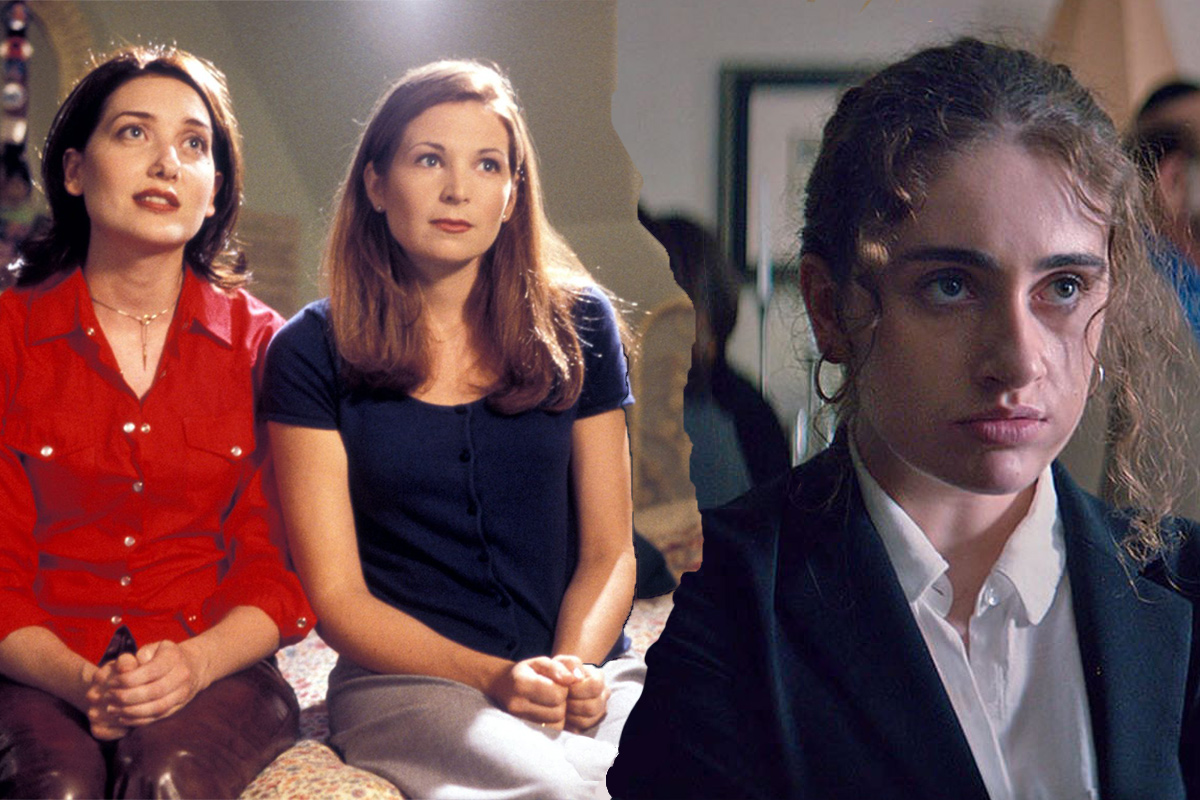Zoe and I met in the most Jewish way possible: a playful yet piercingly analytical argument over Passover food. We were strangers sitting next to each other at brunch until she swiveled around, equal parts curls and poise, and semi-apologetically interrupted my rant to ask about my experience with matzah pizza. I quickly learned about Zoe’s girlfriend, her parents’ farm where they yell “Tekiah!” at the chickens until they cluck, and her sharp analysis of the feminist role modeling (or lack thereof) from Tevye’s daughters in “Fiddler on the Roof.”
Did I mention Zoe is 17? Not to brag but, I, an elder millennial, have a Gen Z friend.
Zoe and I are both queer, feminist, exuberantly Jewish women, with subtly different ways of expressing those identities. I couldn’t quite put my finger on the difference, until I realized this is the 20th anniversary of my formative queer Jewish movie, “Kissing Jessica Stein.”
The things that made “Kissing Jessica Stein” even lightly transgressive in 2001 now have nitro successors in shows like “Broad City,” “Crazy Ex-Girlfriend,” and, especially, Emma Seligman’s 2021 film, “Shiva Baby.” The distance between the two generations of culture precisely mirror those between me and Bestie Zoe.
Released in spring-summer 2001, many of the characteristics of “Kissing Jessica Stein” are endearingly cringe in 2021. For one thing, the main character has a full-time job in an office, as a copy editor, for a print newspaper. The movie’s most dated line may be its most prophetic: explaining that she (again, a media professional) doesn’t use email, Jessica, played by Jennifer Westfeldt, clarifies, “I just think [computers] are numbing and obscuring our humanity.” We sure showed her, right?
Jessica’s character arc is founded on her presentation as a conventionally femme woman, with equally conventional relationship goals: monogamous marriage to a (presumptively cis and white) Jewish man. The movie’s first scene opens on Yom Kippur services, where Jessica’s mother, played magnificently by Tovah Feldshuh, is scoping out potential suitors in an all-too-audible stage whisper. (Who among us has not had a moment of ashamnu, bagadnu, did you hear he got divorced?)
As someone who is both horny and Jewish to an excessive degree, this scene was For Me. (Reader, I swiped on Tinder throughout my friends’ Sheva Brachot. Ashamnu, bagadnu, wyd?) But the stakes that may have felt narratively daring in 2001 are obliterated by the 2021 version.
The setting of “Shiva Baby” is more claustrophobic, displaying the cacophony of any nouveau shtetl gathering. Forget sitting politely in the pew — here’s your old neighbors, camp bunkmates, cousins whose names escape you, the whole megillah, all up in your face. Meanwhile, the sexual threshold has extended past queerness to include kink and sex work. Forget the stress Jessica feels over bringing her secret girlfriend to Shabbat dinner; Danielle has to navigate the far more taboo issue of running into her sugar daddy (who happens to be her father’s former employee) at a shiva call.
If anything, “Kissing Jessica Stein” is a gentler, more accurate portrayal of Jewish family, ritual and socio-romantic pressures than “Shiva Baby,” which dials up the intensity for comedic effect. It shows the warmth and comfort of Jewish practice, like when Jessica sings the Kiddush blessing over Shabbat wine. The scene that still makes me cry, even on my 47th (??) watch, is between Jessica and her mother (named Judy, as required by halacha). The scene gets at the heart of the film: namely, how we can mistake perfectionism for genuine fulfillment and pride. Judy recounts to her beloved daughter the time when Jessie got the lead in a school play and quit because “your co-star wasn’t good enough, and you said, ‘I don’t want to be part of anything that isn’t good enough.’” Feldshuh ends the monologue with sublime poignancy — “I always thought you would have been so much happier doing that play” – then connects Jessica’s journey to self-acceptance with her emerging queerness: “Jessie … I … I think she’s a very nice girl.”
It is that lovely but too-neat connection between Jessica’s arcs of self-discovery that makes “Kissing Jessica Stein” easy to criticize: Jessica’s queerness is a plot device in what is otherwise a lovely New York romantic comedy and feminist bildungsroman. Today, Jessica’s anguish over dating a woman feels sheltered and closed-minded, especially for a writer in New York in her 20s. Westfeldt and her co-lead, the exquisite Heather Juergensen, are both high femme. One of their first conversations is a heavy-handed discussion of lip color as a metaphor for tolerating imperfection. Their wardrobes merge easily, all spaghetti-strap dresses, cardigans, and knee-length boots. Jessica’s family’s Scarsdale prosperity and Helen’s art world glamour lend the film an impenetrable privilege in both class and gender presentation.
Perhaps one of the key differences between the “Kissing Jessica Stein” and “Shiva Baby” generations is September 11, a milestone in generational shifts regarding technology, danger and overall optimism regarding our future. Danielle in “Shiva Baby” has a ragged, defensive edge, an anxiety incubated by a time period where financial and physical security feel much more precarious, and the respectability politics around things like sex work are rendered completely irrelevant by existential uncertainty.
One of the pleasures of rewatching “Kissing Jessica Stein” is a sweet return to a bourgeois New York that still exists somewhat (for rich white people, of course) — the breeziness of hailing a cab (no checking your Uber driver’s progress) to go from the wine bar to the Indian restaurant downtown. Sidewalk ice cream. Tickets to a sold-out show on Broadway. Late-night strolls past alluringly sweaty dudes on their stoops. Ephron-esque in its best moments, this world is a low-stakes fantasy, where the world of “Shiva Baby” is edgier and more radical.
For now, it’s nice to imagine Danielle as Jessica’s niece, a time-traveling bestie like my Zoe, the one who did end up doing the play, fucking whomever she pleases, and never worrying about whether they, or she, was good enough.



